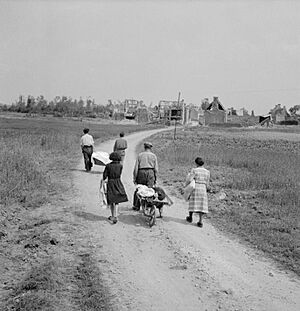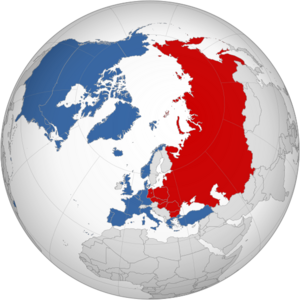Post-war facts for kids

A post-war or postwar period is the time right after a war ends. This term often refers to the years following World War II, which finished in 1945. Sometimes, a post-war period can turn into an interwar period if the same groups start fighting again later, like between World War I and World War II. But usually, "post-war" means the fighting has stopped for good.
Contents
Life After World War II in the US
Major Events After World War II
The "post-war" period can mean different things in different countries. It depends on how the war affected them. Here are some important events that happened after World War II:
- The Cold War (1947–1991)
The Cold War was a long-term disagreement between the United States and the Union of Soviet Socialist Republics (USSR). The US believed in capitalism and democracy, while the USSR believed in communism. They didn't fight each other directly. Instead, they supported different sides in smaller wars around the world, called "proxy wars." Both sides built up huge amounts of nuclear weapons. They knew that if they used them, it would lead to "mutually assured destruction" (MAD), meaning both sides would be completely destroyed. This idea actually helped prevent a full-scale nuclear war. Later, tensions eased, and the Cold War ended in 1991 when the Soviet Union broke apart. This left the United States as the world's strongest country.
- Korean War (1950–1953)
On June 25, 1950, North Korea (communist) attacked South Korea (democratic). Soon, UN forces, led by the US, joined to help South Korea. They pushed back the North Korean invasion and almost took over North Korea. Then, Chinese forces joined to help North Korea. They pushed the US, South Korean, and UN forces back to where they started. After three years, nearly five million people had died. Even today, there are still disagreements between North and South Korea.
- Civil Rights Movement (1954–1968)
In the 1950s, African Americans faced unfair treatment and separation, called segregation, especially in the southern United States. Many couldn't even vote. In 1954, the Supreme Court made a big decision in a case called Brown v. Board of Education. They ruled that separating students by race in public schools was against the law. By the end of the 1950s, however, only a small number of Black children in the South were going to schools with white children.
- Vietnam War (1955–1975)
The Vietnam War was fought between communist North Vietnam (supported by the Soviet Union and China) and South Vietnam (supported by the United States). This war was very tough because North Vietnamese soldiers and fighters in South Vietnam used surprise attacks and hidden tactics against the South Vietnamese and US armies. Vietnam was one of the first wars shown on television. Many Americans, both civilians and soldiers, were against the war because of the difficult conditions and because they felt it had no clear purpose. After many protests, the United States slowly pulled its troops out of Vietnam.
The Cold War's End
The "post-war" period is sometimes seen as ending with the Dissolution of the Soviet Union on December 26, 1991. After this, people usually talk about the "Post–Cold War era" instead of "post-war."
Life After World War II in the UK
In Britain, "post-war" has a few meanings:
- In arts and culture: It refers to a style in art and buildings, especially before the rise of Pop Art in the 1960s. Styles like functionalism and brutalism were common. These styles focused on simple, basic shapes.
- In politics and economy:
- Broadly: It covers the time from when Clement Attlee became Prime Minister in 1945 until Margaret Thatcher became Prime Minister in 1979. This period is known as the "post-war consensus."
- More specifically: It refers to the immediate time after the war. People worked together, and there were high taxes, especially on inherited money. Britain also started letting go of its colonies, a process called decolonization. The National Health Service was created, providing free healthcare for everyone. There was also a lot of rationing of food and other goods. Life became easier as the world economy recovered and new technologies appeared in the late 1950s. This led to more people owning cars and choosing private homes over public housing.
See Also
- Interwar period
- Pre-war (not the same as interwar when talking about World War I)
- Aftermath of the September 11 attacks
- Postbellum
- Reconstruction era of the U.S.
- Post–Cold War era
 | Stephanie Wilson |
 | Charles Bolden |
 | Ronald McNair |
 | Frederick D. Gregory |


